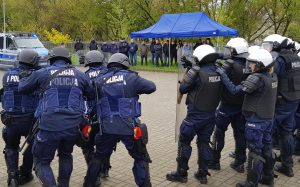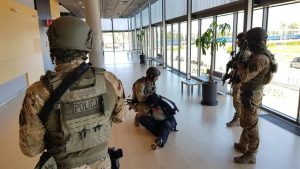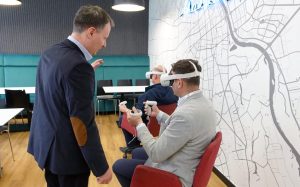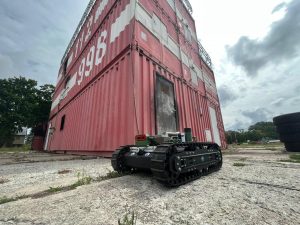We are analysing the motto of Poland’s EU Presidency through the lens of the Horizon Europe Framework Programme. Experiences, successes, and challenges of Polish beneficiaries of the EU Framework Programmes in the area of “security.”
Security is one of the many key challenges of the European Union, a global leader, whose goal is to protect its citizens from the growing threats of today’s world. In the EU Security Strategy for 2020-2025, the European Commission (EC) outlined the main actions, tools and measures aimed at ensuring European security, both in the real and digital worlds and in all aspects of social life. The strategy is implemented through programmes such as Horizon Europe, the Digital Europe Programme, the European Defence Fund, and the Internal Security Fund. The synergy between centrally managed EC programmes and national programmes allows the effective use of funds and the provision of technological solutions to improve security in the EU.
Cybersecurity, migrations, natural disasters
The implementation of European projects within the topics announced by the European Commission supports the priorities of the Polish Presidency in the Council of the EU in the area of broadly understood security – especially considering that the presidency’s motto is “Security, Europe!”. Challenges such as cyberattacks require coordinated responses and new technological solutions. Migration caused by a lack of security and economic instability in the world and in the EU’s neighbourhoods, as well as the increase in the flow of people and goods, requires innovative concepts that enable more effective and better-integrated border management. Natural disasters or man-made catastrophes can threaten essential social functions such as health, food supply, or energy.
Therefore, it is crucial to undertake joint research and seek new security-related solutions which in turn will reduce the risks associated with current threats. In the field of security research, projects must consider the human factor and social context and ensure respect for fundamental rights, including privacy and data protection. Citizens should be able to engage in assessing the social impact of security technologies to improve the quality of outcomes and build public trust.
Horizon Europe as support for security

The Horizon Europe Framework Programme, as the largest research and innovation program in the world, with a budget of 93.5 billion EUR for 2021-2027, creates a unique platform for scientific, technological, and operational cooperation, including in civil security. This area is primarily addressed by Cluster 3 – Civil Security for Society (covering, among others, internal security and cybersecurity, as well as border security), under which Polish institutions have so far received 9.1 million EUR net funding for the implementation of 34 projects. The leading beneficiaries, both in terms of awarded funding and the number of projects, including as coordinators, are: the Polish Platform for Homeland Security (8 projects with a total net funding of 1.6 million EUR) and ITTI Sp. z o.o. (4 projects, 1.3 million EUR).
Krzysztof Samp, Vice President of ITTI Sp. z o.o., when asked whether his company sees synergy between R&I projects in the field of civil security under Horizon Europe and other European Commission programmes (e.g., the European Defence Fund), stated that R&I projects allow development and testing of technological solutions in various fields. For ITTI, which develops dedicated solutions and IT systems, these areas include protection against chemical and radiological threats, cybersecurity, decision support systems, and solutions for detecting smuggled materials and people.
Renata Rycerz, an expert at the National Contact Point for Horizon Europe, at the National Centre for Research and Development (NCBR), and a Polish coordinator for Cluster 3 – Civil Security for Society, emphasizes that most of these solutions can also be successfully applied in other sectors of the economy. R&I projects in the area of civil security allow the development and testing of technological solutions in various fields.

ITTI develops and adapts technologies related to the detection and identification of chemical threats or cybersecurity solutions to meet the needs of users in projects implemented under the European Defence Fund. They also propose the use of ground-based unmanned platforms, on which they test the integration of various sensors from the civil security area, for applications in the construction sector (e.g., for monitoring work progress).
Decision support systems developed in projects related to climate protection under Horizon Europe or increasing the energy efficiency of buildings under Horizon 2020, can be applied in decision-making processes related to crisis management. Information technologies, including increasingly common artificial intelligence (AI) mechanisms, offer broad possibilities for improving the operations of users in both the civil and military sectors. The experiences from the war in Ukraine show that many solutions and technologies have so-called dual-use applications, according to the Vice President of ITTI.
Synergies between EU programmes
Krzysztof Samp added that the experiences gained during the coordination of projects funded by the EU Framework Programmes (e.g., Horizon Europe’s project CHIMERA on protection against chemical, radiological, and biological threats, coordinated by ITTI) are useful when applying for project coordination in other programs (e.g., the EDF-funded project RAPTOR, aimed at developing a system for remote monitoring of weapon status for predictive maintenance).
This project is also coordinated by ITTI and its launch is planned for this spring. We have experience working for other European organisations, such as the European Space Agency, the European Defence Agency and the European Southern Observatory – said Krzysztof Samp.
R&I projects in the area of civil security under the Horizon Europe programme

Polish uniformed services and other public institutions responsible for internal security over the years increase their participation in projects funded under European programmes such as Horizon Europe (mainly Cluster 3), the Internal Security Fund Police (ISFP), the Border Management and Visa Policy Instrument (BMVI), and JUST.
Rashel Talukder, Managing Director of the Polish Platform for Homeland Security, believes that participation in these initiatives allows the development of staff competencies, access to the latest technologies and innovative solutions, and building of international networks – which is crucial for effectively countering contemporary threats. Regarding the areas of involvement of Polish uniformed services, Rashel Talukder emphasised that they are very broad. For the Police and the Internal Security Agency (ABW), this includes criminal prevention through countering and detecting radicalisation, combating organised crime, detecting and countering threats related to the use of unmanned vehicles, combating cybercrime, protecting critical infrastructure, and addressing hybrid threats. For the Border Guard, the focus is mainly on border protection and preventing illegal crossings, while the Fire Service is more concentrated on rescue operations, including in the event of natural disasters.
According to the Director of the Polish Platform for Homeland Security, participation in European projects primarily provides access to knowledge, competencies, contacts, and technologies that support services and other public institutions. These projects allow for gaining experience and exchanging best practices among services from all over Europe and beyond.
In recent years, the involvement of Polish uniformed services in Horizon Europe projects has significantly increased, particularly of the Police (including the Police Headquarters, provincial police headquarters, and the Metropolitan Police Headquarters, as well as the Central Bureau for Combating Cybercrime, the Police Forensic Laboratory, and the Police Academy), the Internal Security Agency and the Fire Service.
We are keeping our fingers crossed for more successful projects from entities such as the Border Guard and the Customs Service,” says Renata Rycerz, adding that the participation of end-users, such as uniformed services, is mandatory in projects implemented under Cluster 3 of Horizon Europe.
The active participation of the Police Headquarters in Poland (the Police Headquarters and provincial headquarters, such as those in Kielce, Radom, and Gdańsk) is noteworthy, as they are implementing a total of 9 projects with net funding of nearly 773,000 EUR.
How to secure additional grants? What are the challenges for the Polish security sector?

Renata Rycerz from the National Contact Point believes that despite numerous successes achieved in recent years, Polish institutions and uniformed services still face significant challenges that require further development and engagement. Rashel Talukder from the Polish Platform for Homeland Security sees the need to create new or strengthen existing teams within the structures of services and public institutions that deal with research and innovation and their implementation into daily practice. – An enormous challenge remains the effective use of financial resources received under projects funded by the European Commission in the category of “remuneration”, which could further motivate officers and civilian employees to engage more in project implementation – he said. In his opinion, Polish institutions should increase their presence in initiatives such as the Community for European Research and Innovation for Security (CERIS), which aims to facilitate interaction within the security research community and users of research results, or the Security Mission Information & Innovation Group (SMI2G), which is a unique networking platform designed to stimulate innovative ideas and create potential consortia. Participation in information days organised by the European Commission and the National Contact Point at NCBR, dedicated to announced calls in various thematic areas of the Horizon Europe programme, is also important.
Active participation in such events promotes the exchange of experiences, networking and identification of new collaboration opportunities.

Polish uniformed services and public institutions are playing an increasingly significant role in European projects, which enhances their competencies and strengthens Poland’s position internationally.
“In recent years, I have observed increasingly active participation of key European entities in international events and cooperation networks,” notes Renata Rycerz, an expert from the National Contact Point.
Krzysztof Samp, representing the industrial business, emphasised that it is important to consider the future use and commercialisation of technologies and solutions developed within Cluster 3 projects. It is crucial to validate the proposed solutions at the national level in terms of their usefulness for specific services and agencies. R&I projects are an excellent platform for such activities.
Joint, multi-faceted efforts for security, currently led by the Polish presidency under the motto “Security, Europe!”, are key to building an integrated, strong, and secure Europe. Grants from Horizon Europe – and other European programmes – are an important element of support in these endeavours.
*The EU-RADION project was initiated to enhance Europe’s capabilities in detecting and identifying radiological and nuclear threats. The consortium developed an integrated sensor system and advanced data processing algorithms, enabling rapid identification of hazardous materials. The solutions were tested in both laboratory and field conditions, confirming their operational usefulness. A key outcome was the improvement of situational awareness through tactical command tools, providing real-time threat visualization and coordination of first responders’ actions. The implementation of EU-RADION technology allows more effective response to CBRN incidents, increasing public safety and stimulating market innovation in radiological protection.
**The C-SHIELD project focuses on developing a mobile system for detecting chemical threats, combining two technologies (Ion Mobility Spectroscopy and Flame Photometric Detection) in an integrated measurement point. Thanks to dedicated translators, each sensor transmits data in a unified format, which is then processed at the sensor node layer. This approach significantly reduces false alarms and facilitates the identification of various chemical agents. Laboratory and field tests confirmed the effectiveness of data fusion in improving detection accuracy and selectivity. Ultimately, C-SHIELD enhances operators’ situational awareness by offering a clear interface and MQTT communication protocol, leading to faster and more accurate decisions in CBRN operations.


